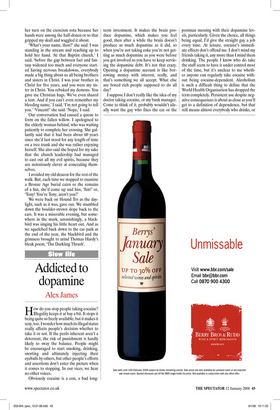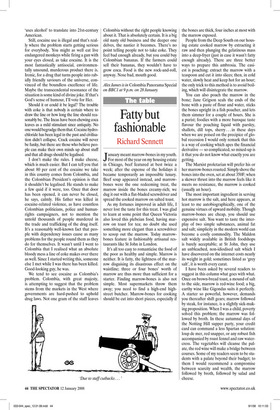Addicted to dopamine
Alex James
How do you stop people taking cocaine? Illegality keeps it at bay a bit. It stops it being quite so freely available, but it makes it sexy, too. I wonder how much its illegal status really affects people’s decision whether to take it or not. If the perils inherent aren’t a deterrent, the risk of punishment is hardly likely to sway the balance. People might be encouraged to start smoking, drinking, snorting and ultimately injecting their eyeballs by others, but other people’s efforts and assertions don’t enter the picture when it comes to stopping. In our vices, we hear no other voices.
Obviously cocaine is a con, a bad long term investment. It makes the brain produce dopamine, which makes you feel good, then after a while the brain doesn’t produce as much dopamine as it did, so when you’re not taking coke you’re not getting as much dopamine as you were before you got involved so you have to keep servicing the dopamine debt. It’s not that crazy. Opening a dopamine account is like borrowing money with interest, really, and that’s something we all accept. What else are bored rich people supposed to do all day?
I suppose I don’t really like the idea of my doctor taking cocaine, or my bank manager. Come to think of it, probably wouldn’t ideally want the guy who fixes the car or the postman messing with their dopamine levels, particularly. Given the choice, all things being equal, I’d give the straight guy a job every time. At leisure, cocaine’s immediate effects don’t offend me. I don’t mind my friends taking it, any more than I mind them drinking. The people I know who do take the stuff seem to have it under control most of the time, but it’s unclear to me whether anyone can regularly take cocaine without being cocaine-dependent. Alcoholism is such a difficult thing to define that the World Health Organisation has dropped the term completely. Persistent use despite negative consequences is about as close as you’ll get to a definition of dependence, but that still means almost everybody who drinks, or ‘uses alcohol’ to translate into 21st-century American.
Still, cocaine use is illegal and that’s really where the problem starts getting serious for everybody. You might as well eat live endangered monkeys while firing a gun with your eyes closed, as take cocaine. It is the most fantastically antisocial, environmentally unsound, murderous product there is. Ironic, for a drug that turns people into rabidly friendly saviours of the universe, convinced of the boundless excellence of life. Maybe the transcendental resonance of the situation is some kind of divine joke. If that’s God’s sense of humour, I’ll vote for Her.
Should it or could it be legal? The trouble with coke is that nobody is certain where to draw the line or how long the line should reasonably be. The Incas have been chewing coca leaves as a mild stimulant since antiquity. No one would begrudge them that. Cocaine hydrochloride has been legal in the past and civilisation didn’t collapse. Crack cocaine will never be funky, but there are those who believe people can make their own minds up about stuff and that all drugs should be legalised.
I don’t make the rules. I make cheese, which is much easier. But I can tell you that about 80 per cent of the cocaine we take in this country comes from Colombia, and the Colombian President’s opinion is that it shouldn’t be legalised. He stands to make a few quid if it were, too. Once that door has been opened, it can never be closed, he says, calmly. His father was killed in cocaine-related violence, as have countless Colombian politicians, police and humanrights campaigners, not to mention the untold thousands of people murdered in the trade and trafficking of the drug itself. It’s a reasonably well-known fact that people with dependency issues cause as many problems for the people round them as they do for themselves. It wasn’t until I went to Colombia that I realised what an absolute bloody mess a line of coke makes over there as well. Since I started writing this, someone else I met while I was there has been killed. Good-looking guy, he was.
We tend to see cocaine as Colombia’s problem. Colombia, with great majesty, is attempting to suggest that the problem stems from the markets in the West where governments are hard-pushed to uphold drug laws. Not one gram of the stuff leaves Colombia without the right people knowing about it. That is absolutely certain. It is a big old nasty old business and the deeper one delves, the nastier it becomes. There’s no point telling people not to take coke. They feel bad enough already, but you could buy Colombian bananas. If the farmers could sell their bananas, they wouldn’t have to grow coca. Food is the new rock-and-roll, anyway. Nose bad, mouth good.



























































 Previous page
Previous page